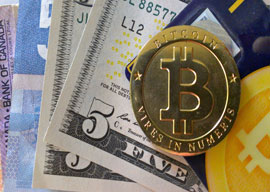
November 21, 2013

With increasing coverage in the media, BTC went from appearing on the world financial stage like an alien debutante (reported on by outlier pundits such as Max Keiser)…to entering mainstream discussion in serious broadsheets…to finding articulate support in the op-eds of the Journal or the FT. In a short time it’s come a long, long way.
And since October, so the Beeb correctly reported, the currency has trebled in value. Where now?
Now? Now it’s gotten the go-ahead from the political establishment. Trigger-fingered and fearless speculators will drive up the price, tracking BTC’s PR profile, in line with the currency’s increasing media coverage, trebling”or even quintupling”their money in the process (the latter if they started buying BTC in very early September).
These returns make some people (say, sensible investors and real currency traders) angry; it makes many giddy.
The bitcoin phenomenon is technology-led, above all; for better or worse. Regulatory approval for bitcoin acts like a tonic upon its value. It sends the price upward. To enjoy it, bitcoin mania must be taken with a pinch of salt: Its trade is small”tiny”compared to countries’ official currencies.
According to blockchain.info, a website illustrating BTC stats and data, there were 40,000 bitcoin transactions on the first of this month (November 2013). Notable on the same chart, by contrast, is the fact that the last day’s trading saw 88,600 BTC transactions. These gyrations are typical of bitcoin and have been seen many times before. The data prove, however, that bitcoin’s usage is wider than originally thought. Having been known primarily as the only currency accepted on the drug-and-guns cyber-market Silk Road, the FBI’s closure of the cyber-market barely”and only briefly”dented the volume of transactions.
The Senate committee underlines the word on the street. The word is that bitcoin is real, it’s legal, and it’s not going away. Unfortunately Silk Road founder Ross Ulbricht is going away. He was arrested for running the cyber-market and (allegedly) using it to contract hit men to eliminate embezzling and blackmailing employees. The Silk Road and bitcoin, in a unique partnership, made Ulbricht a millionaire many times over; that’s just the bitcoin we know about. These are shady associations.
The irony is, the Silk Road’s success was almost uniquely due to bitcoin”and an Amazon.com-style checkout system, which Ulbricht carefully emulated, as the Financial Times recently pointed out. The crypto-currency enabled buyers and vendors to trade drugs and weapons without fear of being traced because it anonymizes the transaction and the bitcoin cash trail generally. Bitcoin is, like cash in the real world, nearly untraceable. Given this characteristic and the implications for law enforcement, I’m grateful for the Senate’s conclusion yesterday.
Much has been made in the press of how cheap it is to conduct transactions in bitcoin. Another great virtue lies in the fact that BTC is truly a universal currency. Baidu.com, which has the monopoly in online search in China, accepts bitcoin.
BTC’s rapid growth, combined with a paucity of virtual currency regulation in China, has led to the commission of fraud only a week after the announcement that BTC China had conducted a record number of transactions globally:
GBL, a Chinese bitcoin trading platform that claimed to be based in Hong Kong, recently shut down “ an event that might not be worthy of note had ¥25m ($4.1m) worth of users” money not disappeared with it.
Speculation and fraud. Sounds like the real world to me.